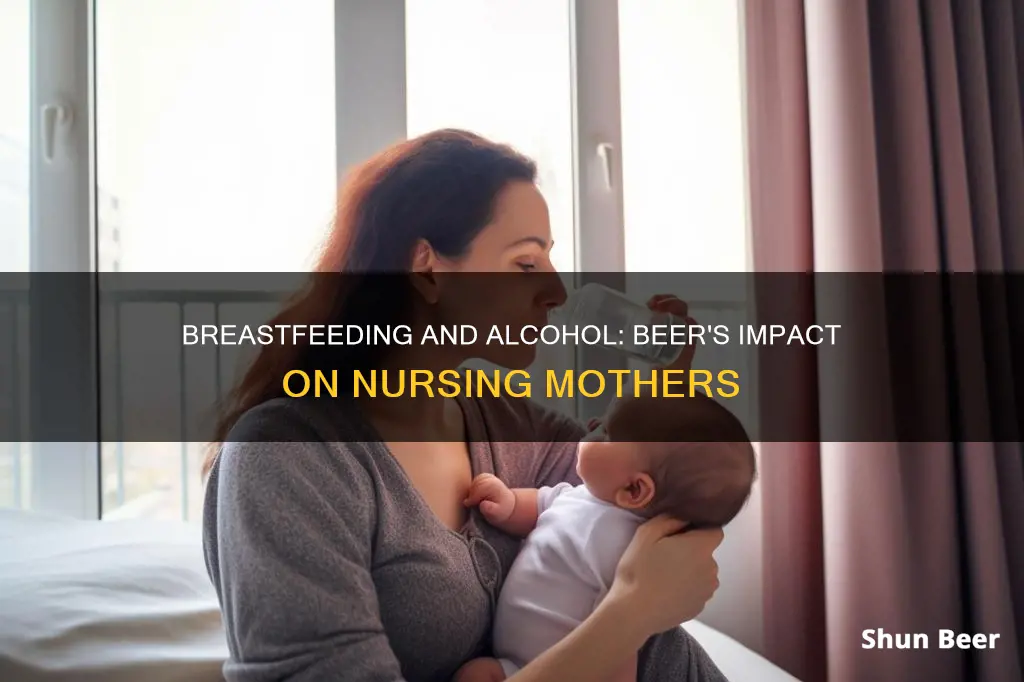
There are many conflicting opinions on whether it is safe for breastfeeding mothers to consume alcohol. While some sources suggest that drinking in moderation does not harm the baby, others recommend abstinence. The American Academy of Pediatrics recommends avoiding alcohol while breastfeeding, as it is transferred to the baby through breast milk. However, the amount of alcohol transferred is relatively small and drinking moderately is likely safe. To minimise the amount of alcohol that reaches the baby, mothers can wait for a couple of hours after drinking before breastfeeding or express and store milk beforehand.
| Characteristics | Values |
|---|---|
| Can breastfeeding mothers drink beer? | Yes, but in moderation. |
| How much can they drink? | One standard drink (12 ounces of beer, 5% alcohol) per day. |
| How long after drinking beer can they breastfeed? | Wait for at least 2 hours after drinking one beer. For each additional drink, wait for 2 more hours. |
| How long does alcohol stay in breast milk? | Alcohol can be detected in breast milk for about 2-3 hours after a single drink, 4-5 hours after 2 drinks, 6-8 hours after 3 drinks, and so on. |
| Does drinking beer increase milk supply? | No, it decreases milk supply. |
| Does drinking beer affect the baby? | Yes, it can cause sleep disturbances, decreased milk intake, impaired immune function, delay in motor development, and potential impairment of cognitive development. |
What You'll Learn

Occasional light drinking while breastfeeding
If your baby needs to feed before the two hours are up, it is safe to use previously expressed milk or formula. It is not necessary to "pump and dump" after drinking alcohol, as this does not reduce the amount of alcohol in your milk. Instead, the amount of alcohol in your milk will decrease over time as the levels in your bloodstream fall. Additionally, drinking alcohol on an empty stomach increases its effects on your body, so it is advisable to eat a meal while consuming alcohol.
It is also important to be aware of the potential risks of drinking alcohol while breastfeeding. Even a small to moderate amount of alcohol may impair milk production and the milk ejection reflex, leading to decreased milk intake by the baby. Alcohol consumption can also cause negative effects on the baby's sleep patterns, including increased REM sleep and decreased total sleep time. Furthermore, repeated exposure to alcohol in breast milk could potentially cause long-term harm to nursing babies, although more studies are needed to confirm this.
In summary, while occasional light drinking while breastfeeding is generally considered safe, it is important to take the necessary precautions to minimise the amount of alcohol that reaches your baby and to be aware of the potential risks associated with alcohol consumption.
Drinking Non-Alcoholic Beers: How Many Is Too Many?
You may want to see also

Alcohol in breast milk and its effects on babies
Breast milk is affected by alcohol consumption, and the alcohol content in breast milk rises and falls with the alcohol in the mother's bloodstream. The alcohol level in breast milk is usually highest 30 to 60 minutes after a drink, and it can be detected for about 2 to 3 hours per drink consumed. The more alcohol consumed, the longer it stays in the breast milk. For example, one drink can be detected for 2 to 3 hours, two drinks for 4 to 5 hours, and three drinks for 6 to 8 hours.
Babies are rapidly growing and developing, and alcohol can have harmful effects on their brains and organs such as the liver. While occasional drinking by a breastfeeding mother is unlikely to harm the baby, regular exposure to alcohol in breast milk is linked to developmental delays.
Alcohol can interfere with the milk ejection reflex, also known as 'let-down', and reduce the baby's milk intake. Research has shown that babies consume 20% to 23% less milk in the three to four hours after the mother has consumed alcohol. This can lead to decreased weight gain and impaired immune function.
Alcohol can also disrupt the baby's sleep patterns, causing increased REM sleep and shorter sleep periods. Some studies have also found potential impairment of cognitive development and a reduction in the ability for abstract reasoning at school age.
To minimise the risks to the baby, it is recommended that breastfeeding mothers avoid drinking alcohol completely or limit their consumption. If they do choose to drink, they should wait for at least two hours per drink before breastfeeding or expressing milk.
It is important to note that expressing and discarding milk after drinking alcohol does not reduce the amount of alcohol in the mother's milk more quickly. The level of alcohol in the breast milk will decrease as the alcohol clears from the bloodstream.
Beer Drinking and Astral Travel: A Curious Combination
You may want to see also

Pumping and dumping breast milk after drinking alcohol
Pump and dump refers to the practice of pumping your breast milk and discarding it after consuming alcohol or any other substance you may be concerned about passing to your baby through your breast milk. The idea behind pump and dump is that alcohol can pass through breast milk and affect your baby's health. However, research shows that pumping and dumping is not necessary in most situations.
When you drink alcohol, it enters your bloodstream and eventually makes its way into your breast milk. The amount of alcohol that passes into your milk depends on your blood alcohol concentration (BAC) and the amount of time that has passed since you consumed the alcohol. According to the Centers for Disease Control and Prevention (CDC), alcohol leaves breast milk at the same rate that it leaves your bloodstream. Therefore, the amount of time it takes for alcohol to leave your breast milk depends on how much alcohol you consumed and how much time has passed since you drank. As a general guideline, it takes about 2-3 hours for a single drink to leave your breast milk. However, if you're concerned about the amount of alcohol in your breast milk, it's always best to wait a little longer before breastfeeding or pumping.
The CDC recommends that breastfeeding mothers wait at least two hours after consuming a standard drink before nursing or pumping milk for their baby. This gives your body enough time to metabolize the alcohol and eliminate it from your milk. However, the amount of alcohol that passes into your milk is typically quite low, even after a drink or two. In fact, research suggests that the amount of alcohol in breast milk is just 5-6% of the adjusted maternal dosage. So, if you're only having a drink or two, it's unlikely to have any negative impact on your baby.
The Bottom Line
Drinking a glass of wine, a beer, or a cocktail here and there while you're a nursing mother is just fine if you want to. Timing is key, though. Try to have that drink right after you breastfeed so the alcohol is out of your system when it's time for your next feeding or pumping session.
Beer and Doxycycline: Is It Safe to Mix?
You may want to see also

How long to wait after drinking alcohol to breastfeed
It is recommended that breastfeeding mothers cut out drinking alcohol completely. However, moderate alcohol consumption, defined as up to one standard drink per day for women, is not known to be harmful to the infant. Nevertheless, the American Academy of Pediatrics recommends avoiding alcohol while breastfeeding, as alcohol does reach the baby through breast milk.
If a breastfeeding mother chooses to drink alcohol, it is important to wait at least 2 hours after having a drink before feeding the baby. This allows time for the alcohol to leave the breast milk. The alcohol level in breast milk is essentially the same as the alcohol level in the mother's bloodstream, and it decreases over time. The alcohol levels in breast milk are usually highest 30 to 60 minutes after consuming an alcoholic beverage, and alcohol can generally be detected in breast milk for about 2 to 3 hours per drink. The more alcohol consumed, the longer it takes for the alcohol to be cleared from the body. For example, alcohol from two drinks can be detected for about 4 to 5 hours, while alcohol from three drinks can be detected for about 6 to 8 hours.
To ensure the baby's safety, it is important to be aware of the potential negative consequences of drinking alcohol and breastfeeding. Alcohol can cause drowsiness, deep sleep, weakness, and abnormal weight gain in the infant. It can also decrease the milk ejection reflex in the mother, leading to reduced milk intake by the baby. Additionally, drinking alcohol can impair a caregiver's judgment and ability to care for the infant safely. Therefore, it is recommended to have a sober adult care for the baby if the mother is intoxicated.
To maintain a healthy balance, breastfeeding mothers who choose to drink alcohol can follow some safety suggestions. It is recommended to breastfeed the baby immediately before consuming any alcoholic beverage or pumping and saving the milk. Limiting alcohol intake to one or two drinks and waiting at least 2 hours after drinking before breastfeeding are also important. If the baby needs to be fed before the 2 hours are up, previously expressed milk can be used. Eating food while drinking alcohol can help slow the rate at which alcohol enters the bloodstream.
Beer Drinkers Can Lose Weight Too!
You may want to see also

Alcohol's effect on breast milk supply
Alcohol can decrease breast milk production and disrupt the milk ejection reflex, also known as let-down. Studies have shown that infants consume less milk after their mothers consume alcohol, even when the nursing time and frequency remain unchanged. This reduction in milk intake is attributed to the inhibitory effect of alcohol on the hormones prolactin and oxytocin, which are crucial for milk production and ejection. Additionally, alcohol can cause dehydration, further impacting milk supply.
The amount of alcohol consumed and the timing of consumption are essential factors. It is recommended to wait for at least two hours per drink before breastfeeding or pumping, as alcohol levels in breast milk closely parallel blood alcohol levels. The highest alcohol concentration in milk typically occurs 30 to 60 minutes after drinking. Consuming more than one drink can further delay the milk ejection reflex and decrease milk intake by the infant.
The effects of alcohol on the infant's sleep patterns and development are also noteworthy. Research indicates that alcohol exposure can disrupt sleep patterns, causing increased REM sleep and decreased total sleep time. Additionally, long-term exposure to alcohol in breast milk may negatively impact the infant's motor development and cognitive function.
In summary, while occasional drinking in moderation may not be harmful, it is essential to consider the potential impact on milk supply and the infant's well-being. Breastfeeding mothers should be cautious and well-informed about the effects of alcohol to make informed decisions regarding their alcohol consumption.
Drinking Beer Fast: Why You Won't Get Drunk
You may want to see also
Frequently asked questions
Yes, it is possible to have a beer while breastfeeding, but only in moderation. It is recommended to wait for at least 2 hours after drinking a 12-ounce beer before breastfeeding.
According to the American Academy of Pediatrics, it is best to avoid alcohol completely while breastfeeding. However, having one drink a day has not been found to be harmful to the baby, especially if there is a gap of 2 hours between drinking and nursing or pumping.
Yes, drinking alcohol can affect the balance of hormones that control breast milk production and reduce supply. Alcohol also inhibits the milk ejection reflex, which may result in the baby consuming less milk.







